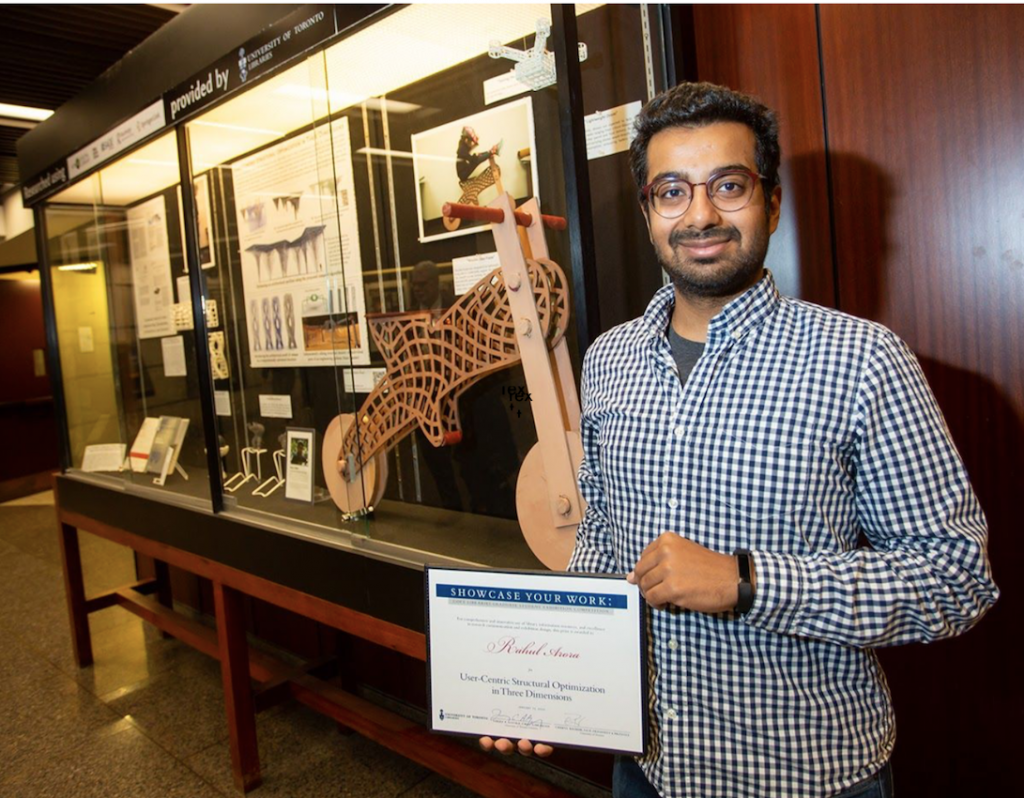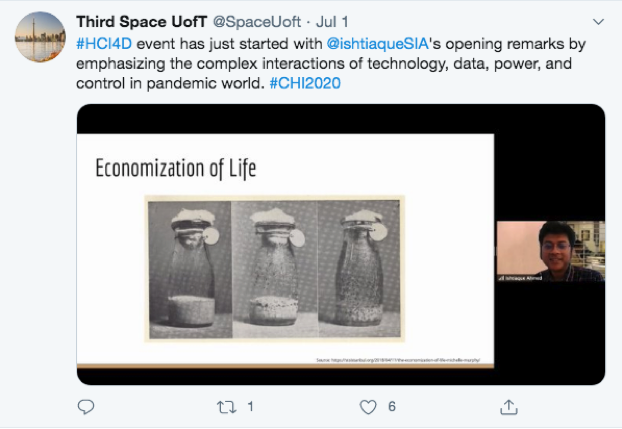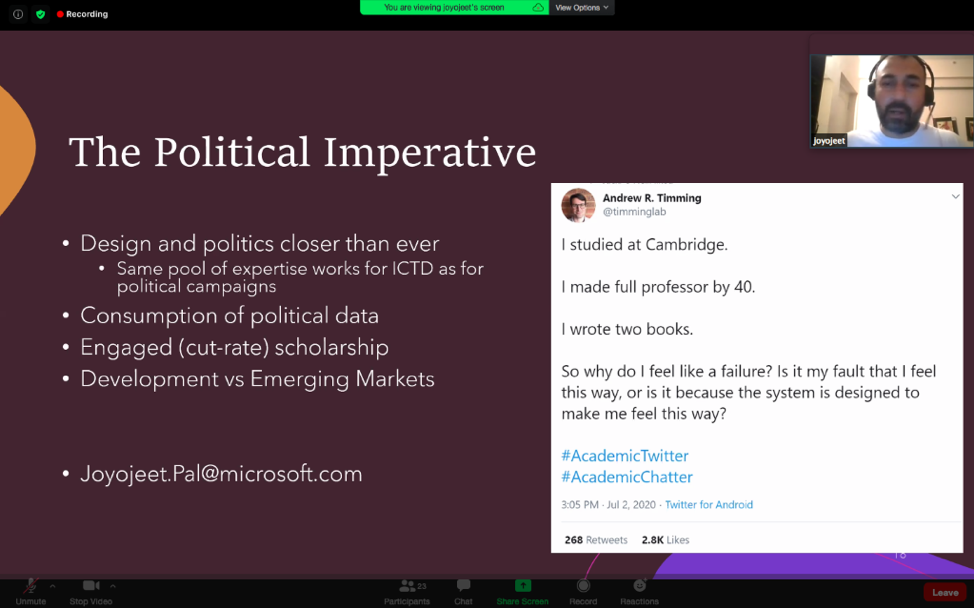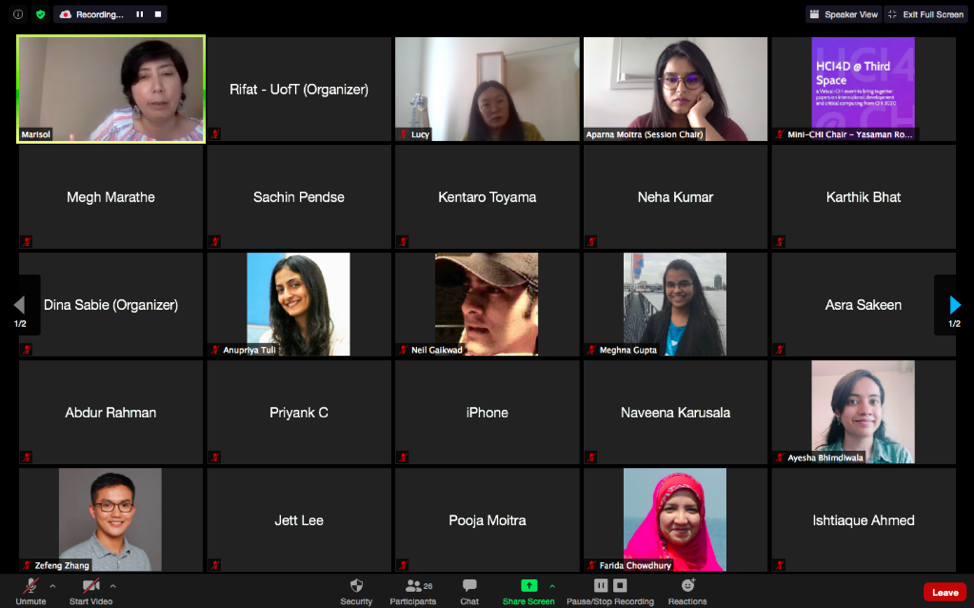Congratulations to Yasaman for being awarded a 2020-2021 Ontario Graduate Scholarship. The OGS is awarded to students for academic achievement, so the congrats again on a job well done Yasaman!
Category Archives: Uncategorized
Thirdspace hosts 2-day event for CHI 2020
Third Space research group at the DGP lab organized a two-day virtual HCI4D event on July 1-2, 2020. This event brought together papers on critical computing and international development published at CHI 2020. 22 papers from four different continents were presented at this event and 210 participants from across the world registered to attend this virtual event. The program featured research on diverse areas including healthcare, accessibility, migration, automation, communication among communities, and design. Two keynote speakers— Prof. Ishtiaque Ahmed from the University of Toronto and Prof. Joyojeet Pal from Microsoft Research, India—delivered thought-provoking speeches on Hope and Political imperatives of development research.
CHI is the largest conference for research related to human-computer interaction (HCI) and this year it was canceled due to the COVID-19 pandemic. As a result, researchers across the world lost an opportunity to present their works to larger audiences. Many regional HCI communities, research domain-specific groups, and universities stepped forward and organized virtual CHI events at different scales. The events presented subsets of CHI 2020 papers. The Third Space research group joined them and organized this event to showcase HCI for Development (HCI4D) papers from CHI 2020.
Figure 1: Two keynote speakers. (left) Prof. Ishtiaque Ahmed talking about Hope and design. (right) Prof. Joyojeet Pal is talking about the political imperatives of development.
The two–day program began at 8:30 am in the morning and went on until 5:00 pm EDT. Prof. Ishtiaque Ahmed delivered the opening keynote presenting some critical reflections delving into Prof. Michelle Murphy’s conception of “economization of life” and concluded by sharing ideas on integrating “hope” with design. The paper presentation sessions were initiated after the opening keynote. The event was divided into a total of six sessions with each session being two hours long. Three to four papers were presented in each session and were categorized based on the shared themes of the paper. Each paper was given 15 minutes for presentation and five minutes for a question-answer (Q&A) session. At the end of each session, based on the preferences of the participants, there were options to move forth with an extended Q&A session or create breakout rooms for participants to socialize with each other. Since one of the key goals of conducting this event was to provide ample opportunities to participants for socializing, we created several breakout rooms on Zoom so that participants could meet each other and socialize. The program concluded with an honest and engaging closing keynote by Prof. Joyojeet Pal on the political imperatives in HCI4D research.
Figure 2: A subset of participants.
Twitter buzz created around the two-day event as well as positive feedback shared by participants at the end of the session break-out rooms were very encouraging and inspired the organizers to hold similar programs at regular intervals. Its virtual nature provided participation and networking opportunities to emerging HCI4D researchers, especially from the Global South who are otherwise unable to participate and network internationally due to various resource constraints. The Third Space research group hopes to organize this event at a larger scale next year onwards, collaborating with more diverse researchers and presenting research published in CHI as well as other HCI4D venues.
Renowned Experts Launch First-of-its-Kind Book on COVID-19 Problems and Solutions
The COVID-19 Solutions Guide provides tools for readers that assist them with the pandemic’s personal, financial, and emotional impacts.
TORONTO, Canada, July 2, 2020: In response to the impacts of COVID-19 on society, recently we launched the e-book The COVID-19 Solutions Guide. This innovative publication provides many solutions for current issues. A blog provides regular updates.
COVID-19 has disrupted economic growth, social norms, health and safety. Over 11 million individuals worldwide have been infected; over 525,000 have died, 131,000 of them in the USA.
The authors are well qualified to write this book. Dr. Ronald Baecker is Emeritus Professor of Computer Science and Bell Chair in Human-Computer Interaction at the University of Toronto, as well as co-founder and namer of DGP.. Dr. Gary Feldman is a retired physician who served as the Public Health Officer of Ventura County and Riverside County in California for 14 years. Professor Judith Langer is a Distinguished Emeritus Professor of Education who specializes in language, literacy, and learning. Justin Stein is a financial advisor with a practice focused on helping families and business owners protect and manage risk.
The COVID-19 Solutions Guide is now available for purchase on the team’s website and at Lulu Books. It will soon also be available on the Kindle, Nook, and Kobo.
Mohammad Rashidujjaman Rifat, Priyank Chandra and Prianka Roy have received the UofT COVID-19 Student Engagement Award
Rifat, Priyank and Prianka have been awarded one of the UofT COVID-19 Student Engagement awards. Congratulations! Their project is titled “Investigating the Spread of Misinformation by Religious Preachers” and described here:
We have two goals in this project: First, analyzing the phenomena of COVID-19 related fake news generation and spread by religious preachers on social media. Many religious preachers around the world generate and spread inappropriate, false, and overly inflated partial truth relating to COVID-19. On the other hand, their followers often lack sufficient knowledge for fact-checking the information. Our exploration will involve an analysis of the diffusion network of misinformation by preachers and a qualitative exploration of the multifaceted roles of technology in spreading misinformation generated by preachers. This particular goal also involves re-assessing existing definitions of fake news through which misinformation-is categorized and analyzed in existing research. Second, using religious institutional forces to mitigate the generation and effect of fake news. Clergies in religious organizations hold strong social capital. We will explore how we could use their social capital to combat the spread of misinformation with the help of technology.
Dina Sabie and Cansu Ekmekcioglu Dedeoglu win the UofT COVID-19 Student Engagement Award
Dina (DGP Lab) and her collaborator Cansu (iSchool) were awarded one of the UofT COVID-19 Student Engagement awards. Congrats Dina and Cansu! The project, titled “We’re in this Together: Mapping Resilience, Solidarity, and Hope during a Global Pandemic”, summary is below:
The COVID-19 pandemic has affected the mental state of a countless number of people globally due to income loss, inability to visit friends, closures of support service infrastructures (e.g. community centers), and much more. Our initiative will be part of a motion to help people in distress in managing the affective aspect and wellbeing subsistence of being locked down in one space by implementing a webpage with an interactive world map where people around the globe share short audio recordings about positive and negative things that can be contributed directly to the COVID-19 closure. By doing so, 1) people who share their stories will get a form of resilience because they will be talking about things they may not be able to do currently, and 2) people who listen to the narratives of others can find solidarity and hope in being quarantined.
Prof. Jacobson receives Siggraph Significant New Researcher Award
Prof. Alec Jacobson was awarded the 2020 Siggraph Significant New Researcher award for his contributions to computer graphics. The award cites his work in geometry processing on shape deformations and mesh tetrahedralization along with his role as a collaborator and maintainer of the open source libgl library and technology transfers from his work to commercial software as examples of contributions being recognized by this honour. Congratulations Alec!
CHI 2020 Honourable Mention Award
Congratulations to Prof. Ahmed, Dina Sabie and Samar Sabie on their CHI 2020 Honourable Mention Award! Their paper “Memory through Design: Supporting Cultural Identity for Immigrants through a Paper-Based Home Drafting Tool” received an honourable mention from the Best Paper Committee judging it to be in the top 5% of all papers submitted. Prof. Ahmed also received an Honourable Mention for Others’ Images: Online Social Media, Architectural Improvisations, and Spatial Marginalization in Bangladesh with Nusrat Jahan Mim (Harvard University).
Student Rahul Arora Awarded by U of T Libraries Graduate Student Exhibition
Rahul Arora, a PhD candidate and current DGP student, was awarded at this year’s U of T Libraries Graduate Student Exhibition Competition. His work titled “User-Centric Structural Optimization in Three Dimensions” is on display on the first floor of Robarts Library through the month of February.
Of his research, Arora explains, “We wanted to build a structural optimization method which helped users control optimized structures intuitively and efficiently. For this purpose, we built a novel truss-optimization algorithm inspired by hexahedral meshing research in the geometry processing community. While the algorithm itself is an end goal, the hope is that out work also inspires more research into improving the end-user experience for computational structural optimziation tools.”

For more information about the exhibit, Arora has provided a link to his research: http://www.dgp.toronto.edu/projects/michell/
To find out more about previous publications and work that Arora has done, please visit his website: http://www.dgp.toronto.edu/~arorar
UofT News has a write up here: https://www.utoronto.ca/news/three-graduate-students-win-u-t-libraries-research-awards
UofT Libraries has another write up here: https://onesearch.library.utoronto.ca/grad-exhibit-awards
CVPR 2019 Best Paper Award
Congratulations to Prof. Kutulakos and Sotiris Nousias! Their paper “A Theory of Fermat Paths for Non-Line-of-Sight Shape Reconstruction” received the best paper award at CVPR 2019.
DGP Talk: Quo Vadis Mixed Reality?
We are delighted to welcome Prof. Otmar Hilliges from ETH Zurich to talk about his recent research about Virtual and Mixed Reality.
Title:
Quo Vadis Augmented Reality?
Abstract:
Virtual and Mixed Reality (XR) holds the promise to significantly change the ways we interact with digital information. Despite much progress from both research and industry there are still many challenges to be mastered before XR can become a mainstream interaction paradigm. In this talk I will review where we are as a field, outline some of the challenges ahead and talk about some of the recent research from our lab in this space. In particular, I will discuss new ways to capture rich user input, including full-body pose and detailed hand pose configurations without the need for environment mounted cameras or other tracking systems, enabling rich sensing of human activities in on-the-go scenarios. In the second half of the talk I will discuss novel light-weight approaches to haptic feedback for XR and adaptive UIs that control what information to display where, depending on the user’s internal state.
Bio:
Otmar Hilliges is currently an Associate Professor of computer science at ETH Zurich, where he leads the AIT lab. His research is at the intersection of machine learning, computer vision and human computer interaction (HCI). The main mission is to develop new ways for humans to interact with complex interactive systems (computers, wearables, robots), powered by advanced algorithms and technologies in machine perception, planning and data driven user modelling. Prior to joining ETH he was a Researcher at Microsoft Research Cambridge (2010-2013). His Diplom (equiv. MSc) in Computer Science is from Technische Universität München, Germany (2004) and his PhD in Computer Science from LMU München, Germany (2009). He spent two years as a postdoc at Microsoft Research Cambridge (2010-2012). He has published more than 70 peer-reviewed papers in the major venues on computer vision, HCI and computer graphics and received an ERC starting grant in 2017 for computational approaches to sensing based human-computer interfaces. Finally, 20+ patents have been filed in his name on a variety of subjects from surface reconstruction to AR/VR.




